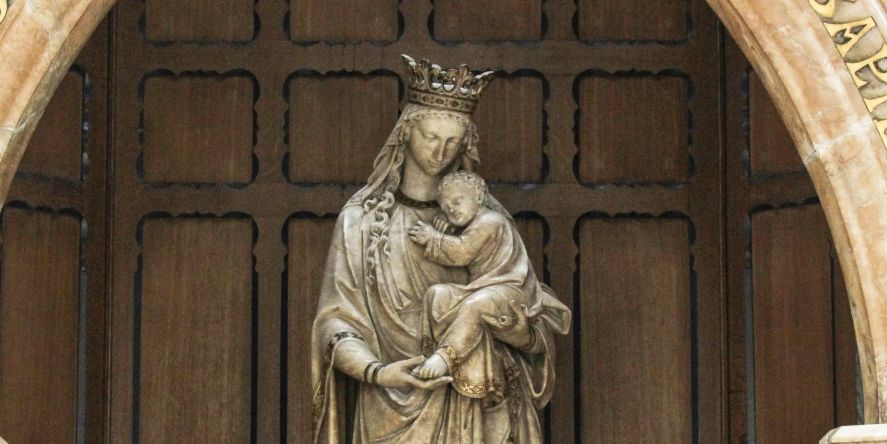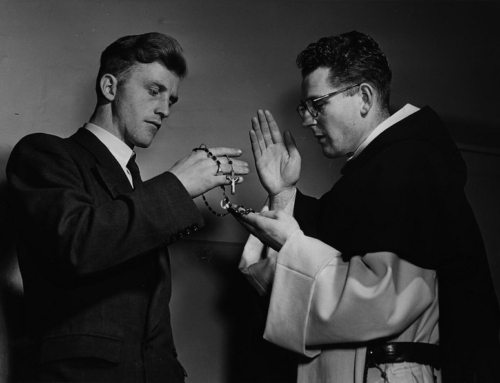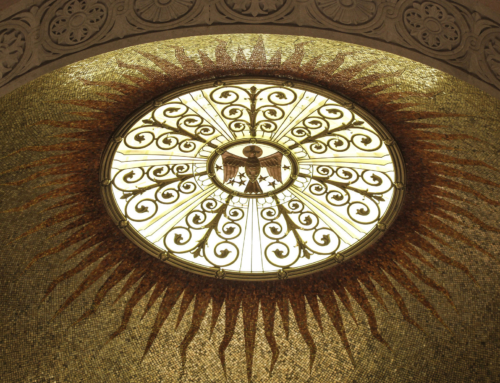I know no better means to establish in ourselves the kingdom of God and to draw Divine Wisdom to our soul than to pray vocally and mentally by saying the Holy Rosary, whilst meditating on its fifteen Mysteries.1
Behold Your Mother
“The mother of Jesus was there” (Jn 2:1). In the Gospel according to Saint John, in stark contrast to the Synoptics, Our Lady’s name never appears. At Cana (Jn 2:1-5), at Capernaum (Jn 2:12), within the Bread of Life Discourse (Jn 6:42), and at the Cross (Jn 19:25-27), we do not see the holy name of Mary but rather “the mother of Jesus,” and “his mother,” and finally “your mother.” In this way, John’s Gospel draws our attention to the most important fact about the Blessed Virgin Mary: she is the mother of Jesus and thus, truly, the mother of God. Motherhood is at the heart of salvation history, and thus, motherhood is at the heart of our own salvation.
God chose to have a mother. “The Word became flesh and dwelt among us, full of grace and truth” (Jn 1:14). The Eternal God took human flesh. The Eternal God desired, chose, and delighted to have a mother, not just so he could “fit in” with the human race or because he did not have the power to save us any other way, but because he wanted salvation to be won through the heart of a tender mother. This is what it means for God to be all-powerful: his will is accomplished not just through his might, but also through other agents, in a manner beyond our understanding. This fact is supremely true of Our Lady.
Saint Luke says that Jesus was obedient to Mary and that she kept this in her heart (Lk 2:51). This relationship of mother and son reached a climax when Mary appeared below her Son’s cross and Jesus said to her, “Woman, behold, your son!” (Jn 19:26). She now was to be the Mother of the Church, which we see manifested as she awaits the coming of the Holy Spirit with the disciples (Acts 1:14). This was made perfect in heaven: “Behold, your mother!” (Jn 19:27), “the queen in gold of Ophir” (Ps 45:9), “a woman clothed with the sun, with the moon under her feet, and on her head a crown of twelve stars” (Rv 12:1).
Wisdom’s Mother
To honor father and mother is one of the Ten Commandments, “the first commandment with a promise,” Saint Paul tells us, “that it may be well with you and that you may live long on the earth” (Eph 6:2-3). This ought to be reason enough for devotion to the Blessed Mother, but the Church, most eager to lead us to our Lady, has continuously taught us to seek out the mother of Wisdom. The Catechism teaches that “what the Catholic faith believes about Mary is based on what it believes about Christ, and what it teaches about Mary illumines in turn its faith in Christ.”2 God’s very choice of Mary teaches us everything we need to know about her, and she shows us—particularly through the rosary—all that we need to know about her Son.
The teaching of the Church concerning our Lady is deeply rooted in the Scriptures, perhaps most prominently in the Wisdom Literature of the Old Testament. Pope Blessed Pius IX, in Ineffabilis Deus, writes:
The very words with which the Sacred Scriptures speak of Uncreated Wisdom and set forth his eternal origin, the Church, both in its ecclesiastical offices and in its liturgy, has been wont to apply likewise to the origin of the Blessed Virgin, inasmuch as God, by one and the same decree, had established the origin of Mary and the Incarnation of Divine Wisdom.3
The Scriptures show us the deep beauty of Mary’s relationship with Christ, preeminently prefigured by the Wisdom authors.4
The Old Testament Yearns for Wisdom
Proverbs begins to reveal the personification of Wisdom as one crying out, “Behold, I will pour out my thoughts to you; I will make my words known to you” (Prv 1:23). This person of Wisdom was present before creation, saying, “When he established the heavens, I was there . . . I was beside him, like a master workman” (Prv 8:27, 30). Indeed, when one reads Prv 9:5-6— “Come, eat of my bread and drink of the wine I have mixed. Leave simpleness, and live, and walk in the way of insight”—who can one think of but Christ? The Wisdom authors show how Wisdom was present in the beginning, and St. John will agree with them: “In the beginning was the Word” (Jn 1:1).
Wisdom is at the heart of everything the people of Israel desired. Saint Paul identifies Christ himself as “the power of God and the wisdom of God” (1 Cor 1:24, emphasis added), surely thinking, in this context, of Wisdom’s own words: “I came forth from the mouth of the Most High . . . in every people and nation I have gotten a possession . . . for eternity I shall not cease to exist . . . in Jerusalem was my dominion” (Sir 24:3, 6, 11).
Wisdom himself came, manifesting himself as the one who says, “Come to me, you who desire me, and eat your fill of my produce” (Sir 24:19; see Mt 11:28). But before he appeared, the Wisdom authors asked, “Whence then comes wisdom? And where is the place of understanding?” (Jb 28:20). Of course, they know the answer: “God understands the way to it, and he knows its place” (Jb 28:23), but the repeated question marks the great desire of all the holy prophets, kings, men, and women of the Old Testament. They all perceived that they would not possess Wisdom unless given it by God himself, and thus they prayed as Solomon in the Book of Wisdom: “I appealed to the Lord and besought him, and with my whole heart I said, ‘O God of my fathers and Lord of mercy, who hast made all things by thy word . . . give me the wisdom that sits by thy throne’” (Ws 8:21–9:1, 4).
Solomon’s Prayer links Wisdom to salvation, as he concludes: “People learned what pleases you, and were saved by Wisdom” (Ws 9:18). Unlike his request for a human kind of wisdom in the Book of Kings, the Book of Wisdom represents Solomon as praying for Uncreated and Eternal Wisdom. Solomon did receive wisdom, but not Wisdom himself. Christ himself praises Solomon’s wisdom but says of himself, “something greater than Solomon is here” (Lk 11:31). Christ is Wisdom Incarnate: he is the link between Wisdom and salvation. This is the “good news of a great joy which will come to all the people” (Lk 2:10, emphasis added). This is the good news that the angels tell the shepherds: the yearning prayer of the Old Testament has finally found its desire. The Incarnation of Eternal Wisdom is a great joy to all people, for all people desire happiness, the true happiness that alone can fill man’s heart, God.5
Mary, Seat of Wisdom
Jesus is not some abstract, school-book wisdom, but Wisdom Incarnate. At the Annunciation, Wisdom came to dwell among men. Thus, Saint Louis de Montfort looks to Mary: The Patriarchs, Prophets, and the just of the Old Law had prayed and sighed and begged for the Incarnation of Eternal Wisdom, but none of them had been able to merit it. No one was found but Mary,” the mother of Wisdom.6 Knowing this, de Montfort says that “the greatest means of all, and the most wonderful of all secrets for obtaining and keeping Divine Wisdom, is a tender and true devotion to the Blessed Mary.”7 Why is that?
A much beloved Marian title is Mary, Seat of Wisdom. This title points to Mary’s relationship with Eternal Wisdom: she is not the cause of Wisdom, but rather the one through whom we can gain Wisdom. Jesus is the Uncreated Wisdom for which every soul yearns, yet until our Lady became his mother in the flesh, how could we have had access to him? The Book of Sirach, describing the advent of Wisdom, portrays Wisdom as both eternal, “for eternity I shall not cease to exist” (Sir 24:9), and as desiring a home among men: “Among all these I sought a resting place” (Sir 24:7). Seemingly, there is not a home for Wisdom, not until this commandment of God: “Make your dwelling in Jacob” (Sir 24:8). Does this not describe the hour that “the angel Gabriel was sent from God to a city of Galilee named Nazareth” (Lk 1:26)? De Montfort says, “It is true to say that Jesus is the fruit and the product of Mary wherever he is found—in heaven, on earth, in our tabernacles, and in our hearts—and that Mary alone is the tree of life, and Jesus alone is the fruit of that tree.”8
Mary is the Mother, Seat, and Fount of Wisdom, and Jesus—Eternal Wisdom himself—is our salvation. Where else would one go to obtain the purest fruit but from the purest tree? According to de Montfort, we have four options for obtaining Wisdom. The first means is ardent desire—meaning perfect obedience to the commandments. The second is to pray with a pure and lively faith unceasingly. The third is a universal mortification which is continuous, courageous, and prudent. These three were the means sought by the early Christian martyrs and desert monastics, who recognized that the price of Eternal Wisdom was one’s entire life. Looking at these first three means, we might be tempted to despair. The fourth means, however, is quite simple, easy, and light, and it is even older. It is the one offered to the Beloved Disciple (and all of us) by Jesus on the Cross: a tender and true devotion to the Blessed Virgin.
Jesus is “the way, and the truth, and the life” and “no one comes to the Father” but by him (Jn 14:6). Jesus is the way, and if we are going to follow him, we need to go to the “virgin betrothed to a man whose name was Joseph, of the house of David” (Lk 1:26), be obedient to her (Lk 2:51), and behold her as our mother (Jn 19:26-27). This is the Way of Jesus Christ, with the apostles, devoted to prayer with “Mary, the mother of Jesus” (Acts 1:14).
Give Us Wisdom
Wisdom himself desired, chose, and delighted to have a mother, and he delighted that she should be our mother as well. Jesus came at Mary’s words: “Behold, I am the handmaid of the Lord; let it be to me according to your word” (Lk 1:38). We, the followers of the Son, are right to be devoted to his Mother. Among the Book of Proverbs’ first instructions is “Reject not your mother’s teaching,” for it is “a fair garland for your head, and pendants for your neck” (Prv 1:8-9). What is our Mother’s teaching if not the fair garland of roses, with the pendant of the crucifix that adorns the rosary? She continues to be the one through whom we can most swiftly come to her Son:
The Son of God, Eternal Wisdom, by making Himself perfectly subject to Mary as to His Mother, gave her a maternal and natural power over Him, which passes our understanding. He gave her this power, not only for the length of His life on earth, but also in heaven, because heavenly glory, far from destroying nature, perfects it. Hence, in heaven, Jesus is as much the Son of Mary as Mary is the Mother of Jesus. . . . This means that Mary, by her powerful prayers, and because of her being His Immaculate Mother, obtains from Jesus all that she wills, and that she produces Him, every day, in the souls of those she wills.10
Now, in heaven, Jesus has given us the greatest intercessor, because he has given us his mother. If Mary gives us Wisdom, her Son, we will receive him, and we shall be saved. O Holy Mary, Seat of Wisdom! Remember us, dear Mother, and give us Wisdom, your Son.
✠
Download a PDF of this article here.
Endnotes
1Louis-Marie De Montfort. The Love of Eternal Wisdom. Revised Edition. Montfort Publications, 2007, 106-107.
2Catechism of the Catholic Church, 2nd Edition. Vatican City: Libreria Editrice Vaticana, 2000. Paragraph 487.
3Pius IX, Ineffabilis Deus.
4The Wisdom Books of the Old Testament include Proverbs, Job, Ecclesiastes, Sirach, and the Book of Wisdom.
5Cf. Summa Theologiae, I-II, q. 5, a. 8 and q. 3, a. 8.
6De Montfort, The Love of Eternal Wisdom, 113.
7De Montfort, The Love of Eternal Wisdom, 113.
8De Montfort, The Love of Eternal Wisdom, 114.
9De Montfort, The Love of Eternal Wisdom, 99-112
10De Montfort, The Love of Eternal Wisdom, 114.



